Wondering should you clean your roof ? You’re not alone. Many homeowners overlook their roof until visible stains, moss, or leaks appear—often when it’s too late to prevent costly repairs. In this in-depth guide, you’ll discover what experts say about roof cleaning, when action is needed, and how proper maintenance can protect both your investment and your home’s health. Learn when a professional touch is critical, when DIY could be risky, and how regular cleaning keeps your property safe and beautiful for years.
Understanding the Importance: Should You Clean Your Roof for Better Home Health
Roofs quietly guard your home from the elements, but over time, even the best ones are vulnerable to moss, algae, and debris. If you ask roofing professionals, should you clean your roof regularly, the answer is a resounding yes. Cleaning is more than curb appeal—it’s about preventing deterioration that can seep into your attic and living spaces, leading to everything from leaks to poor indoor air quality. Think of your roof as your home's shield. When neglected, organic buildup traps moisture, undermining shingle materials and making your home a hotbed for mold growth.
Beyond health considerations, a clean roof reflects sunlight better, maintaining cooler indoor temperatures and reducing your energy bill. If you’re striving to maintain property value, regular roof cleaning becomes an essential part of your exterior maintenance routine. Specialists agree that proactive care far outweighs the costs of unexpected roof replacement. The bottom line? Clean roofs promote healthier homes, prevent hidden expenses, and enhance comfort for everyone under your roof.
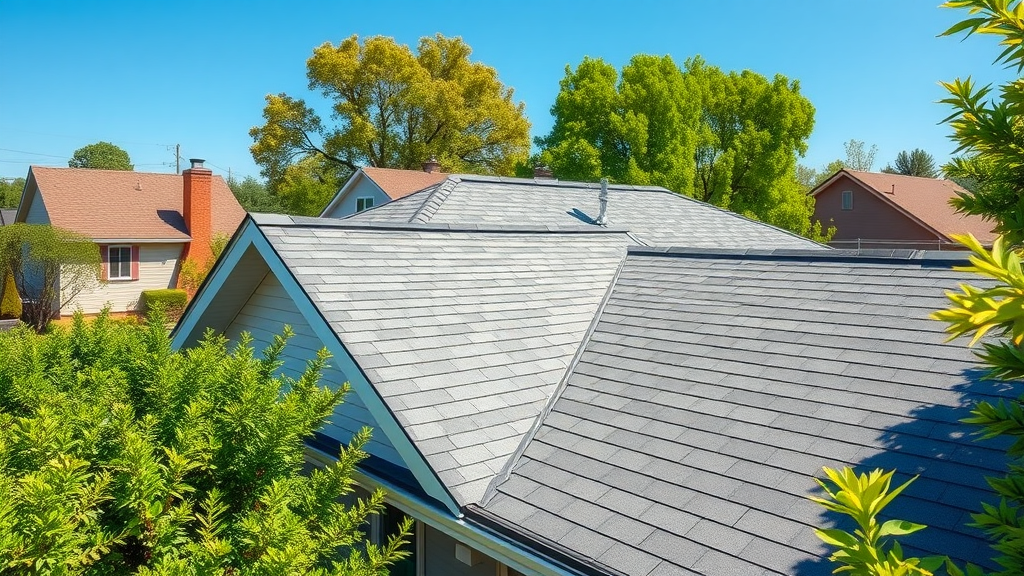
Critical Reasons Homeowners Should Clean Their Roof Regularly
- Preventing costly roof repairs by addressing moss, algae, and debris: Thick moss and algae hold moisture, which can seep beneath shingles and lead to rot, leaks, and expensive structural damage.
- Enhancing curb appeal and maintaining property value through roof cleaning: A spotless roof immediately improves the appearance of your home, making it look newer and more inviting to potential buyers or guests.
- Improving energy efficiency by clearing dark stains and reflective surfaces: Removing dark streaks and buildup lets your roof reflect sunlight efficiently, reducing heat absorption and keeping your home cooler in the summer.
Expert Opinions: What Industry Professionals Say About Roof Cleaning
"Regular roof maintenance is not an option—it’s a necessity every homeowner should prioritize to safeguard their investment." – Certified Roofing Inspector
Industry leaders consistently stress that delayed roof cleaning can shave years off a roof’s lifespan. Experts emphasize the importance of consistent inspections—not just for aesthetics, but to identify early signs of wear or biological growth that threaten the roof’s integrity. Once moss or algae take hold, they quickly accelerate wear and create an environment ripe for even more serious damage.
Furthermore, seasoned roofers highlight that modern cleaning methods, when performed by trained professionals, protect your shingles rather than risk damaging them. The consensus among inspectors and contractors: a clean roof isn’t just about looks—it’s about extending roof life, preventing premature replacement, and keeping your home insurance valid.
Roof Cleaning Methods: What Works Best According to Experts
- Soft wash vs. pressure wash: Pros and cons
Soft washing uses low-pressure water combined with cleaning solutions to gently remove grime and biological stains. Experts recommend soft wash for most asphalt shingles, as high-pressure washing can strip protective granules and void warranties. Pressure washing is best reserved for sturdier, non-shingle materials like some metal or tile roofs—always with caution and correct settings to avoid damage.
- Eco-friendly cleaning solutions for safe results
Many industry professionals now prefer eco-friendly roof cleaning detergents, which eliminate moss, algae, and lichen without introducing harsh chemicals that seep into gutters or harm landscaping. These solutions break down organic material safely, comply with local codes, and help maintain a healthy environment around your property. Selecting non-toxic cleaners ensures safety for both your roof and your family.

Signs You Should Clean Your Roof—Identifying When Action Is Needed
Spotting problems early saves money and stress. But how do you know when should you clean your roof is a question that demands a yes? It’s crucial to observe your roof at least twice a year for visible warning signs. Thick patches of green (moss or algae), black streaks, or areas where the shingles look streaked or faded signal underlying trouble.
Additionally, check gutters and valleys for blockages. When water pools or overflows, it’s a sign that growth or debris is preventing proper drainage. Ignoring these clues can quickly evolve into moldy ceilings, attic rot, or even interior water damage. Catching discoloration, strange marks, or lumpy buildup early, and scheduling a cleaning, can add years to your roof’s life.
- Visible moss, lichen, or algae growth
- Gutter blockages and water ponding on shingles
- Discolored, streaked, or faded roof sections
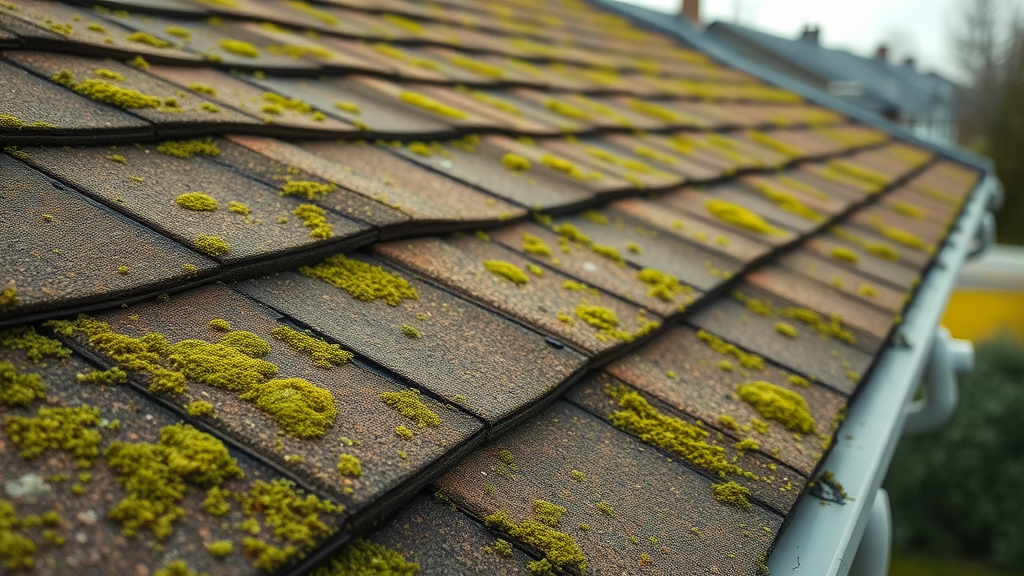
| Roof Type | Recommended Cleaning Method | Risks | Frequency |
|---|---|---|---|
| Asphalt Shingles | Soft wash with eco-friendly solution | High-pressure wash may strip granules | Every 1-3 years |
| Clay/Concrete Tiles | Soft wash or gentle pressure wash (with caution) | Cracking under pressure or harsh chemicals | Every 2-4 years |
| Metal Roofs | Low to medium pressure wash, mild detergents | Scratching/pitting with abrasive tools | Every 3-5 years |
| Wood Shakes | Low-pressure wash, natural cleaners | Splitting/decay with excess moisture | Annually or as needed |
Benefits and Risks: Should You Clean Your Roof Yourself or Hire a Professional?
There are endless “how-to” guides online, but real experts caution that roof cleaning isn’t always a safe DIY project. Evaluating should you clean your roof yourself or call a pro depends on your roof’s material, age, pitch, and the severity of grime. Professionals use specialized gear—and know the signs of underlying roof problems. Plus, insurance companies may not cover damage from amateur work.
Homeowners who DIY risk voiding warranties or, worse, injuring themselves. Slippery shingles and fragile materials present real hazards, especially if you don’t have the right ladders, harnesses, or cleaning agents. If your roof is particularly steep, has multiple stories, or is already failing, calling a certified company is the safest and most effective route to restore your home’s protection and sheen.
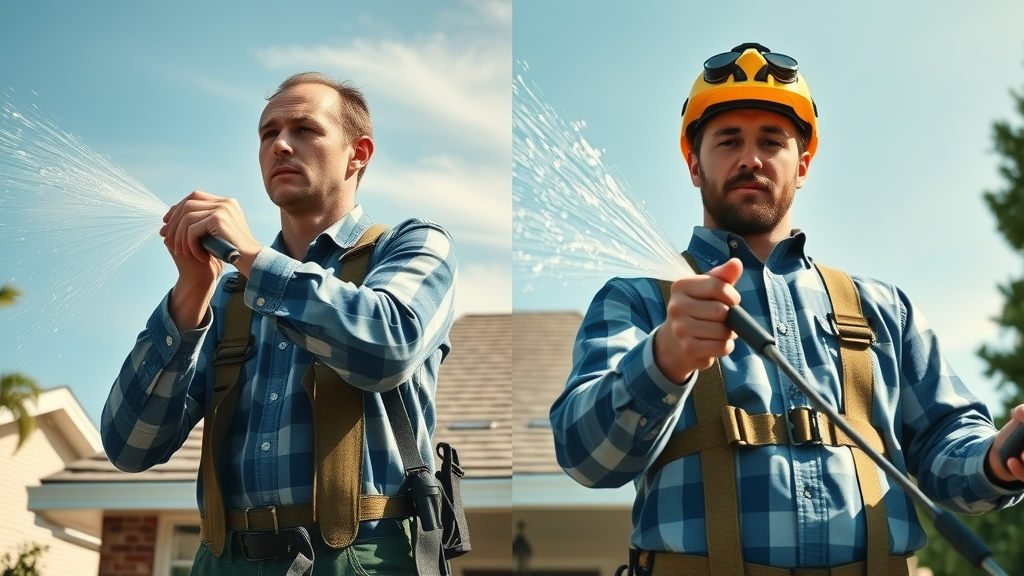
When DIY Roof Cleaning Is (and Isn’t) Safe or Effective
- Assessing the costs, time, and safety factors of each approach: Professionals invest in high-quality equipment and training. While DIY might save labor costs, it often takes much longer and can lead to extra expenses if mistakes or overlooked problems occur.
- Potential hazards of improper roof cleaning: Falls are a leading cause of home-related injuries. Using the wrong tools or chemicals can damage roof surfaces, cause leaks, and ultimately mean pressing pause for costly repairs or insurance claims.
If you’re determined to tackle basic cleaning yourself, only consider the safest, flattest roofs and avoid harsh chemicals or pressure tools. For steep, tall, or delicate roofs—or visible signs of struggle—always trust a qualified professional.
How to Find a Reliable Roof Cleaning Professional
- Questions to ask before hiring a service: Request a written estimate, inquire about the cleaning process, and ask if they specialize in your roof type. Understand what’s included—will minor repairs or preventive treatments be addressed?
- Credentials and insurance: What to look for: Always confirm licensure and comprehensive insurance coverage. Reliable companies provide references and guarantee their work for peace of mind.
Choosing the right professional protects your home and ensures cleaning is safe and thorough—so you get the best value without the risk.
Cost Considerations: Understanding How Much Roof Cleaning Should Cost
Costs vary depending on roof size, material, pitch, and the level of cleaning required. On average, professional roof cleaning runs between $300 and $800 nationwide, with complex roofs or heavy moss buildup raising the price. Soft washing and eco-friendly solutions may cost a bit more but do less damage over time.
Be wary of bids that sound too low—uninsured or inexperienced operators may cut corners, risking both your roof and personal safety. Always ask what’s included in your quote, such as debris removal, gutter cleaning, or additional treatments. Remember, comprehensive care often pays for itself in long-term savings by preventing leaks and extending your roof’s lifespan.
| Roof Size | Soft Wash (Average) | Pressure Wash (Average) | Eco-Friendly Cleaners |
|---|---|---|---|
| 1,000 sq. ft. | $250 - $350 | $200 - $300 | +10% - 15% |
| 2,000 sq. ft. | $400 - $600 | $350 - $500 | +10% - 15% |
| 3,000+ sq. ft. | $700 - $1,000 | $600 - $850 | +10% - 15% |
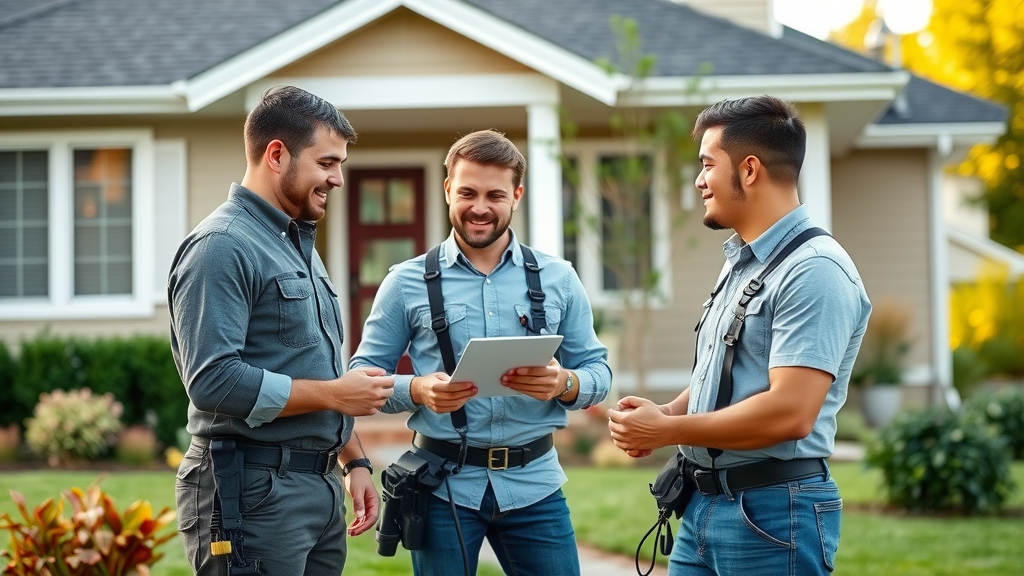
People Also Ask – Should You Clean Your Roof?
How often should you clean your roof?
Most experts recommend cleaning your roof every 1 to 3 years, depending on local weather, shade, tree coverage, and your roof materials. Homes in humid or forested regions may need yearly cleaning, while those in dry, sunny climates can clean less frequently. Regular inspections help you adapt the schedule to your roof’s condition.
What is the safest way to clean a roof?
The safest way is always using a soft washing method with biodegradable cleaning solutions applied by a professional. This avoids damage to shingles, eliminates biological growth, and protects nearby landscaping and gutters. For homeowners, stay on the ground and avoid climbing onto steep or slippery roofs.
Does roof cleaning extend the lifespan of my shingles?
Yes—routine cleaning removes damaging moss, algae, and debris that trap moisture and accelerate wear. Professional maintenance extends shingle life by preventing rot, leaks, and deterioration, often adding several years to your roof’s expected lifespan.
Can roof cleaning invalidate my roof warranty?
Using aggressive cleaning methods—like high-pressure washing or harsh chemicals—can void some roofing warranties. Always follow the manufacturer’s maintenance guidelines and have your roof cleaned by insured professionals who know your shingle’s requirements.
Essential Maintenance Checklist: How to Keep Your Roof Clean and Safe
- Inspect roof bi-annually for moss and algae
- Clean gutters to prevent water damage
- Schedule professional cleaning as needed
- Document cleanings for warranty purposes
Frequently Asked Questions About Roof Cleaning
- Does insurance cover damage from a dirty roof?
Generally, insurance does not cover damage that results from neglect or lack of maintenance. Keeping your roof clean reduces the risk of denials on future claims.
- How long does professional roof cleaning take?
Most residential roof cleanings take between 2 to 6 hours, depending on roof size, slope, and the degree of moss or debris buildup. Larger roofs or extensive moss removal may take a full day.
- Are specific shingles more prone to algae and moss?
Yes, shaded roofs and asphalt shingles are especially susceptible to algae and moss. Modern “algae-resistant” shingles with copper or zinc are less prone to these issues but not fully immune.
- Is it safe to walk on my own roof?
Walking on your roof is risky, especially without safety equipment or experience. Slips, trips, and shingle damage are common, so it’s best to hire a professional for any work above ground.
Key Takeaways for Homeowners: Should You Clean Your Roof?
- Consistent cleaning preserves roof longevity and value
- Professional advice is recommended for delicate or aged roofs
- Prompt maintenance averts expensive repairs and insurance issues
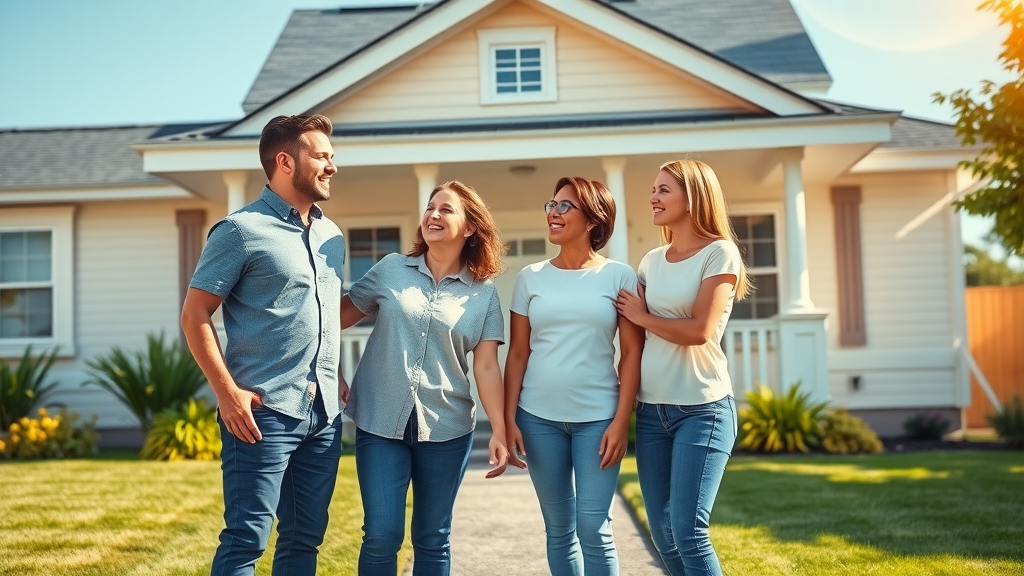
Ready for a Cleaner, Safer Roof? Speak With the Professionals
"An ounce of prevention is worth a pound of cure—annual roof cleaning is essential protection."
Call Refreshing Pro Wash at (541) 636-8094 to Learn More.
Take action now—schedule your professional roof cleaning to safeguard your home, savings, and peace of mind for years to come!
 Add Row
Add Row  Add
Add 

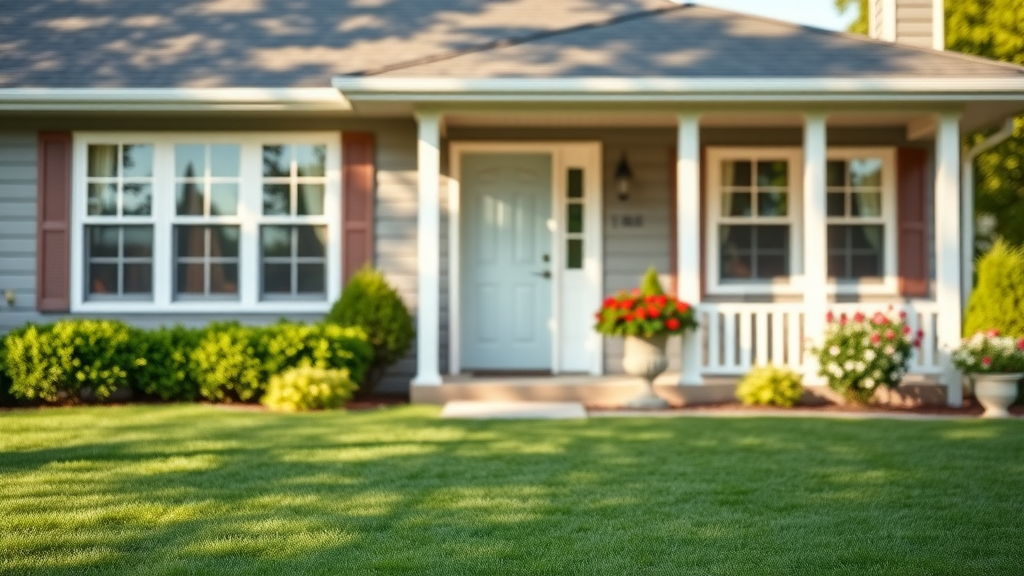
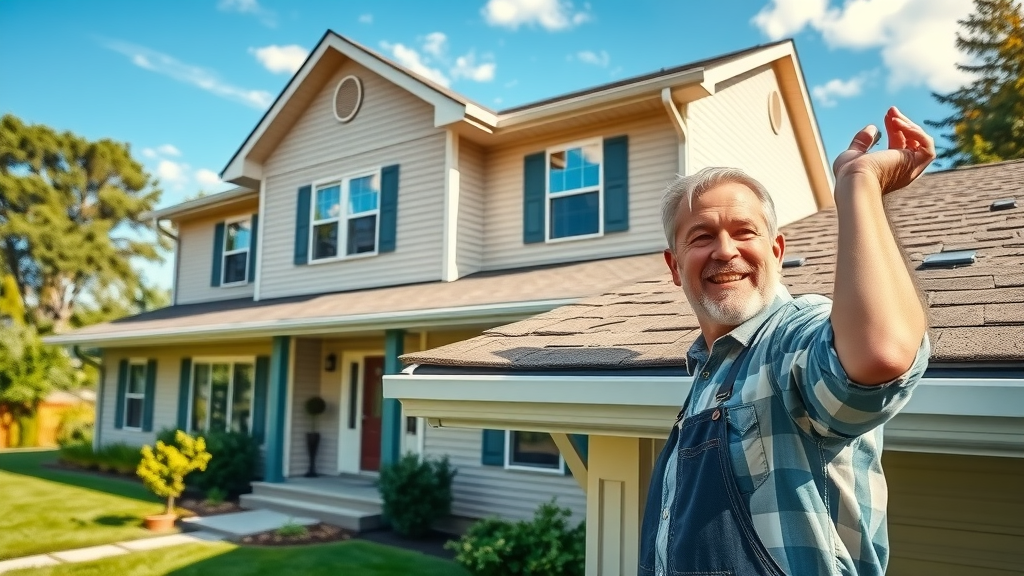

Write A Comment